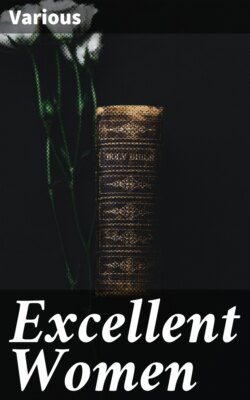Читать книгу Excellent Women - Various - Страница 51
На сайте Литреса книга снята с продажи.
CLOSING YEARS.
ОглавлениеUntil the close of her long life of eighty-four years, Lady Huntingdon retained much of that vigour of intellect which had marked the whole of her career. In spiritual life also she continued to develop year by year. In a letter written to an old ministerial friend on April 26, 1790, she says, "Here (in my heart) every wild and warm imagination, intoxicated by pride and self-love, must end; and submit, not only to learn of the poorest and most afflicted Man in our nature, but also to find in Him, and in Him alone, a suitable relief for all our misery; and, through the same medium, a free access to all divine and heavenly wisdom, whenever a sense of our own evil renders us sufficiently conscious of our wants. Thus faith, that faith which is the substance or subsistence of things hoped for, the evidence of things not seen, must carry the day; and by it walking in the light, as God is in the light, the blood of Jesus Christ cleanses us from all sin; while His heavenly and Divine Spirit, daily carrying us forward, leads us experimentally into those various states which He Himself has declared to be truly blessed."
The decay of her bodily powers was hastened by the breaking of a blood-vessel in November, 1790. During the ensuing illness at her house next door to Spa Fields Chapel she said to Lady Ann Erskine, who was continually with her, "I am well, all is well—well for ever; I see wherever I turn my eyes, whether I live or die, nothing but victory." From this attack she partially recovered, and for months she lingered in a weakened state, eager up to the last for the extension of her Master's kingdom. About a week before her death she was confined to her bed, and during this time she was greatly interested in a scheme for sending missionaries to the South Seas. Lady Ann Erskine and the other watchers, who were unremitting in their attentions, heard her praying day and night, and saying at one time, "I am reconciled in the arms of love and mercy;" and at another, "I long to be at home; oh, I long to be at home!" Only an hour before her death she asked, "Is Charles' letter come?" referring to a request that had been sent to the Rev. Thomas Charles of Bala, asking him to come and preach at Spa Fields. Almost the last words that fell from her lips were a testimony to the strength and clearness of her faith: "My work is done—I have nothing to do but to go to my Father." Soon after saying these words, on June 17, 1791, she "fell asleep in Jesus." She was buried in the family vault at Ashby de la Zouch.
Lady Huntingdon, whose long life thus triumphantly closed, was happy in many ways. She possessed rank and a competency and all the social advantages which such things involve. She was blessed with exceptional vigour of body, of mind, and of spirit. She was happy also in the time of her earthly life. Above all was she happy in the fact that she came so early and so completely under the power of saving faith in the Lord Jesus and under the renewing power of the Holy Spirit. From that time she threw herself into God's work; and by her zeal, ability, and consecration, quite as much as by her rank and wealth, became one of the spiritual landmarks of a wonderful century.
From a course which she believed to be right even John Wesley could not move her; and on one occasion she showed her power even to the Archbishop of Canterbury. About 1770 the prelate then holding that high office, and his wife, gave some balls and parties which scandalised even the gay votaries of fashion who attended them. Remonstrances which Lady Huntingdon addressed to the archbishop, Dr. Cornwallis, through relatives, being treated with ridicule and contempt, she appealed direct to George III. The King and Queen received her most graciously, conversed with her about her religious work for more than an hour, and a few days later surprised the Archbishop by a letter requesting the summary suppression of these "improprieties." The prelate was probably as much astonished as shortly afterwards a lady was, who, in the King's presence, said Lady Huntingdon must surely be insane since she had ventured to "preach to His Grace." "Pray, madam," said the King after he had assured her she was quite mistaken, "have you ever been in company with her?" "Never!" "Then never form your opinion of any one from the ill-natured remarks and censures of others."
Fitted to shine in courts, in an age notoriously pleasure-loving, profligate, and irreligious, she deliberately and whole-heartedly cast in her lot with the despised people of God, "accounting the reproach of Christ greater riches than the treasures of Egypt." She was tried by repeated bereavements, and she had to bear the heavy cross of a son who lived and died in hostility to the Christian faith. But these sorrows only deepened her trust in and her hold upon the Lord Jesus Christ. In 1747 she had written, "My heart wants nothing so much as to dispense all—all, for the glory of Him whom my soul loveth." In 1791, after forty-four long years of hard labour, steady faith, and self-sacrificing zeal, she passed to her eternal rest, with the simple trust that He whose glory she had so humbly and earnestly sought had glorified Himself in her. No nobler close could have been desired for such a life than that which God granted: "My work is done—I have nothing to do but to go to my Father."
